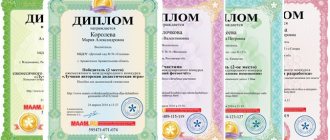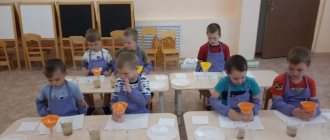Professional online communities
In modern conditions, it is no longer possible to imagine our daily life without new information technologies. And today, more than ever, it is important to move to a qualitatively new level in approaches to the use of computer equipment and information technology in all areas of preschool educational institutions.
The basis of the educational system is the information and educational environment. Interactive human-computer interaction is becoming the basis of the modern educational process.
What do we mean by information and educational environment? This:
- the presence of a system of means of “communication” with information;
- availability of a system for independent work with information;
- the presence of intensive connections between participants in the educational process.
Basic terms
- Community
(from lat.communus - general, collective, corporate) - a group of people doing something together.
- Internet community
- a lot of people communicating with each other using the Internet.
- Educational community
– a group of people exchanging ideas.
- Online community
is a group of people who communicate and conduct joint activities using computer network tools.
A professional network community is a formal or informal group of professionals working in the same subject or problematic professional activity on the network.
Participation in professional network associations allows teachers living in different parts of the country and abroad to communicate with each other, solve professional issues and improve their professional level.
At this point in time, a situation has developed in the urban community where the speed of changes associated with the implementation of the Federal State Educational Standard does not allow teachers to carry out an objective analysis of their own activities, the search for optimal and effective ways and techniques of teaching practice.
And communication with colleagues can solve this problem. This logically begs the question: “When to do this?” ... After all, to communicate you need to meet, you need time, etc.
The purpose of the activity
the network pedagogical community is the development of content that is relevant for Russian education and personally significant for each participant, traditional values of national culture; formation of key competencies in the process of joint educational activities.
Network pedagogical community “Preschool education” - presentation
Network pedagogical community “Preschool education”
A networked pedagogical community is a group of people who communicate and conduct joint activities using computer network tools. A networked pedagogical community is an initiative group of like-minded people who work to solve a chosen problem using technical means of information exchange.
Network = community simple actions of participants + messaging + social services
Objectives of network pedagogical communities: improving the professional skills of teaching staff at various levels; improving the educational and methodological support system for education by reducing the testing time and introducing innovative methods and teaching materials; providing a wide range of interested parties with open access to educational information resources and solutions to current educational issues; creating a model of a multi-level adaptive system for professional development of teachers and their methodological support using the Internet; development of technologies for the formation of information and educational space (increasing the range and improving the quality of educational services provided); organization of joint activities of teachers in a unified educational information environment development of technologies for the formation of information and educational space
Phases of community formation Discussion of topical issues of interest to community members; Exchange of accumulated methodological experience among community members (publication of previously created materials in community libraries); Creation of new teaching materials in working groups, at the request of colleagues, etc.; Organization of master classes, competitions, festivals, etc. by the participants themselves. A working community is at least 10 people who regularly (at least once a week) participate in its work.
Criteria for an effective network professional community of teachers Number of active participants. Duration of community activity (life cycle) Community dynamism (Growth in the number of active participants, number of topics discussed and their rotation, density of discussion) Axiological orientation (conceptuality, purpose, objectives) Design of the community page Sociocultural orientation of interaction (presence of discussions on issues of speech norms, presence in community of the “code of online behavior”, moderation rules and other norms or their discussion) Focus on expanding the scope of cooperation (involving in the discussion teachers from schools where members of the network community work, teachers of the advanced training system, teachers of “related” specialties). A variety of activities that correspond to the goals and objectives of the community Methodological orientation of interaction Information and communication activities of the community (discussion of pedagogical information: forum, chat, services for organizing group trainings)
Possible content of areas of activity of participants in the network pedagogical community: Expert-analytical - assessment of pedagogical developments, educational services, selection of materials of educational value that arise in the implementation process; analysis of information resources on a given problem (topic); selective annotation of textbooks, manuals, didactic and other materials. Advisory - transfer of experience "teacher - teacher", obtaining consultations "teacher - specialist", providing advisory assistance in the development of professional products. Project - creation, development and implementation of network projects for children and adults within the community; participation in a project competition; development of master classes, distance courses, open lessons for community members, Educational - conducting and participation in master classes, distance courses, open virtual lessons; participation in the analysis of tasks for mastery of pedagogical skills; self-education in the process of participating in the discussion of problematic issues related to the activities of the teacher. Scientific and methodological – initiation of discussion of problematic pedagogical issues; creation of methodological and didactic materials; solving inventive problems of an applied nature aimed at improving the educational process.
Sections of the community page: Greeting (address) Emblem News Participants Useful links Methodical piggy bank Free communication area, forums Trainings, competitions, etc. Congratulations, etc.
ATTENTION! By posting material in an online community, you guarantee that: ATTENTION! By posting material in an online community, you guarantee that: the work was done by you personally or you are a co-author (scientific supervisor); for this work you have no obligations to third parties that would prevent the publication of materials; all citations given in the work have links to bibliographic sources; illustrations, photos, videos and graphic materials contain an indication of the original source. materials that do not have links to any sources are copyrighted; photographs and copyright materials of minors are posted with the consent of their parents.
We invite you to co-creation, we are waiting for you!
Factors influencing the formation of a professional network community
There are three main factors that create the foundation of a professional network community:
- Idea.
It is the idea that “grows” with proposals, discussions on the topic, joint research and projects. In many ways, it is the idea that enjoys one degree or another of trust and attracts people of a certain worldview, upbringing, and culture.
- Possibility of communication.
Expressing your opinion, dialogues with people dealing with the same problem, discussion.
John Dewey in his book “Democracy and Education” showed that communication is of decisive importance for the formation of a community, any types of human communities contain a learning function, there are criteria that allow us to determine the measure of the pedagogical value of any type of socialization, a particular community.” - Conditions for idea development
.
New visitors and new members
for the community
to have the opportunity to personally participate in the activities of the community
; the information that other people write is interesting.
Greatest importance for the formation and existence of a community
have the following characteristics:
- Common goals, interests, and needs.
- Shared resources that community members have access to.
- The general context and language of communication in which members of the community are immersed.
So, we tried to solve all the issues considered by creating the network community “Preschool Education” on the city educational portal TolWiki. It is within the community that virtual communication can be realized.
Of course, professionals in their field have gathered here, but young specialists also work at preschool educational institutions, and even the best practicing teachers sometimes need help. Today, all teachers have access to the Internet, so everyone can find the necessary information, but before finding it they have to look through many sites and this takes a lot of time. What better way to go to one resource and select the necessary information there. This could be the development of classes, the legal framework and experience of basic educational institutions, etc.
Let's look at the most popular online teaching communities
Network of Creative Teachers https://www.it-n.ru/ The network was created for teachers who are interested in the possibilities of improving the quality of education through the use of information and communication technologies. Contains a variety of materials and resources regarding the use of ICT in the educational process, and also there you can communicate with your colleagues. The peculiarity is that all materials undergo examination - about 200 materials are uploaded to the portal every day, and only about 15% of which are published. Initially, the network is focused on the joint creativity of teachers of various academic subjects who use information technology in their work.
Network pedagogical community “Open Class” https://www.openclass.ru The project is aimed at ensuring a new quality of education in Russia through the creation of social and pedagogical communities on the Internet, whose activities are aimed at supporting the processes of informatization of schools, the professional development of teachers in in the ICT field, for the widespread dissemination of electronic educational resources and the introduction of methods of use, for the modernization of the system of methodological support for informatization of education, distance learning and much more.
Internet teachers' council https://pedsovet.org/ A space for teachers to communicate at a distance, one of the forms of distance learning and the opportunity to improve professional qualifications. On the one hand, it is a network educational community, and on the other hand, it is a mass media, an active information and communication platform that reflects the state of modern education.
Internet State of Teachers (InterGuru) https://www.intergu.ru/ Project of the Ministry of Education of Russia, publishing house “Prosveshchenie”. The main goal of the project is to create a network community of creative teachers. An open system of independent network projects interconnected by a game economic scheme. The goals of this project are: providing support for the professional activities of teachers; providing the opportunity for self-realization and self-affirmation through joint network practical activities; creation and support of new educational initiatives.
Professional community of teachers Methodisty.ru https://metodisty.ru/ - It is part of the information and educational portal RusEdu, created in 2004 and designed to meet the needs of teaching staff in information exchange, communication and self-realization. Currently, the portal contains many sites united by one topic - education and training.
Letopisi.ru https://letopisi.ru A collective educational encyclopedia that provides for the publication of materials and the maintenance of network projects.
MAGAZINE Preschooler.RF
Activities of professional communities of teachers of preschool educational organizationsEffective examples of the creation and development of professional communities of teachers of preschool educational organizations in the constituent entities of the Russian Federation are a number of information network and regional professional associations of educators as a social network of educators. Within the framework of this network there are the following professional associations of employees of preschool educational institutions:
methodological association of teachers-speech therapists of preschool educational institutions, methodological association of educators;
festival of pedagogical ideas “Open Lesson” , a network of creative teachers, within which communities work for heads of educational institutions and preschool teachers;
professional community “Methodists” , in which there are thematic and discussion platforms for interaction between senior educators, the Federal State Educational Standards for preschool education, and the problems of preschool correctional education are discussed.
An analysis of professional communities of preschool teachers in the Russian Federation was carried out at the federal and regional levels.
Based on the analysis, the following existing professional communities were identified, links to their current sites are presented in Table 1.
An objective assessment of the activities of professional communities of educators in children's educational organizations is part of an integral system of working with personnel in an educational organization. Assessing the effectiveness of the activities of professional communities of teachers of preschool educational organizations underlies the formation of an integrated approach to building effective forms of interaction between participants in the professional community and organizing its work.
Below is a list of existing effective forms of organizing professional communities of preschool teachers in the regions of the Russian Federation (Table 2).
As we can see, today a number of different forms of effective organization are used in the work of professional communities:
network professional community;
methodological association on the basis of a preschool educational institution or a group of preschool educational institutions;
regional association;
professional community of educators and managers of non-state preschool educational institutions.
The main problems of organizing the activities of professional communities in the Russian Federation are:
the lack of information platforms on the Internet for a number of associations (mainly methodological associations based on preschool educational institutions or groups of preschool educational institutions);
lack of interaction between professional associations of different forms and areas of activity (for example, between regional associations and professional associations of teachers of non-state preschool educational institutions);
lack of integration between professional associations of educators and associations of other categories of teaching staff of preschool educational institutions (music directors, junior educators, medical workers);
membership in the professional community is superficial and does not affect the results of the activities of educators (participation in competitions, organization of exhibitions, methodological publications, etc.);
in the activities of a number of communities there is a discrepancy between the goals and nature of the activities;
in most cases, there are no developed mechanisms for financing the activities of communities and encouraging community members (newsletters, participation in seminars, preferential subscriptions to specialized magazines, etc.);
there are no developed schemes, mechanisms and regulations for the interaction of professional communities and educational organizations, government bodies, research centers and institutes dealing with the problems of child psychology and pedagogy, developmental psychology;
low interest of professional communities in attracting sponsorship funds and resources for their development (except for professional communities of educators and heads of non-state preschool educational institutions);
lack of developed mechanisms for integrating professional communities into a unified system of interaction between government authorities and private companies.
Thus, when assessing the effectiveness of professional communities, an important role is played by the organization of communication mechanisms between participants, forms of exchange of experience, and methods of encouraging participants in professional associations. A serious problem remains the integration of professional communities and the development of effective models for organizing their activities. The condition for achieving these tasks is the identification of productive forms of cooperation between professional communities of preschool teachers, the development of methods and tools for assessing the effectiveness of the activities of professional communities of preschool teachers.
The role of professional communities of teachers of preschool educational organizations in the context of the introduction of the Federal State Educational Standard for Preschool Education is determined by the tasks set for preschool education in the Russian education system.
As noted in the State Program for the Development of Education for 2013-2020 (Resolution of the Government of the Russian Federation dated April 15, 2014 No. 295 “On approval of the state program of the Russian Federation “Development of Education” for 2013-2020”), the specifics of the development of preschool education are determined by the demographic situation and is aimed at working with an increased number of children.
The main indicators of the development of preschool education in the period 2013-2020 are:
increasing the availability of preschool education;
increasing the enrollment of children in preschool educational organizations;
increasing the number of children aged 5 years and older enrolled in additional education;
increasing the coverage of children aged 3 to 7 years covered by educational programs that comply with the new Federal State Educational Standard for Education;
increase in the number of children of private preschool organizations in the total number of children of preschool educational organizations.
Federal State Educational Standard for Preschool Education (Order of the Ministry of Education and Science of Russia dated October 17, 2013 No. 1155 “On approval of the federal state educational standard for preschool education” ) defines the main directions for the formation of the educational environment in which the interaction of a child and an adult takes place, taking into account the characteristics of the early childhood period. This environment should facilitate the child’s full enjoyment of childhood and its development.
The formation of an educational environment in accordance with the Federal State Educational Standard for Educational Education should be based on the specifics of the preschool period of child development and the systemic features of preschool education in the Russian Federation.
New quality standards for the provision of educational services, which are recorded in the Federal State Educational Standard for Education, form an innovative system of requirements for the professional competence and professional development of teachers of preschool institutions. In particular, clause 3 of the Federal State Educational Standard for Education determines that one of the main elements of creating a professional environment for preschool education is to promote the professional development of teaching staff. This leads to the need to ensure the professional development of teaching and management personnel: additional professional education, provision of advisory support to teachers and parents (legal representatives) on issues of education and child health (including inclusive education); providing organizational and methodological support, primarily regarding the interaction of children with peers and adults.
In the context of the introduction of the Federal State Educational Standard for Preschool Education and ensuring high standards of professional work for educators, the place and role of professional communities of educators and preschool leaders requires significant changes. The following areas of activity of professional communities become priority:
organizing and conducting advanced training and retraining for teachers of preschool educational organizations in accordance with the requirements of the Federal State Educational Standard for Education;
carrying out accreditation of the activities of non-state preschool educational organizations;
involving professional communities in the accreditation of state preschool educational organizations;
intensifying the activities of professional communities to attract sponsorship funds and resources for the development of the preschool education system in a given region, city, district;
implementation of public-private partnership mechanisms in the activities of professional communities (for example, concluding cooperation agreements with enterprises and companies regarding the screening and care of children of employees, the implementation of certain educational programs, pre-school training programs);
interaction with regional educational institutions, government bodies in terms of ensuring accessibility of preschool education and increasing the enrollment of children in preschool education programs;
methodological, advisory, psychological and pedagogical support for young educators;
formation of an information space, databases on issues of child psychology, didactic games, document flow in preschool educational institutions and other areas for teachers and directors of preschool educational institutions;
interaction with the population and the general public on issues of the quality of educational services provided and, as a result, increased satisfaction of the population with the quality of educational services;
participation of professional associations in attracting specialists and training personnel in additional education programs for preschool children.
In connection with the changing demographic situation in Russia and the increase in the number of children, there is a need for training and retraining of teaching staff to carry out professional activities in the current conditions. Professional communities are a flexible tool for organizing advanced training programs and organizing retraining in accordance with the requirements of the Federal State Educational Standard. In the future, professional communities can take on the function of advanced training and organizing retraining for the FE system.
There is an increase in the number of private kindergartens in the country, which leads to the need to control the quality of educational services provided. Today, professional communities are already implementing various accreditation programs and are developing criteria and guidelines for the accreditation of private preschool educational institutions and the certification of their employees. The urgent task is to develop mechanisms that allow professional associations to intensify participation in accreditation activities in this area.
The area of public-private partnership remains no less promising. Professional communities must have the tools to actively initiate the attraction of sponsorship funds into the preschool education system in the region, city, and district. Private companies and enterprises should be given the opportunity to fully participate in the activities of professional communities and boards of trustees of preschool educational institutions. In particular, professional communities can enter into cooperation agreements with enterprises and companies regarding the screening and care of employees’ children, the implementation of certain educational programs, and preschool programs for the children of employees of private companies.
Today, the activities of professional communities of educators are often semi-formal. It is necessary to develop mechanisms for interaction between professional associations of educators and heads of preschool educational institutions with regional educational institutions, government bodies in terms of ensuring the availability of preschool education and increasing the coverage of children in preschool education programs, and the participation of professional communities in the formation of educational policy.
In connection with the increase in the number of kindergartens, including non-state preschool educational institutions, and the planned increase in the salaries of preschool teachers, an influx of young specialists into the field of preschool education is envisaged. There is a need for methodological, advisory, psychological and pedagogical support for young educators through their participation in schools for young educators, forums for young specialists and other forms of practical training. A promising area of activity for professional communities is the implementation of various forms of mentoring and transfer of teaching experience for their participants, especially young educators.
In this regard, it is important to note the function of professional communities in the formation of an information space, databases on child psychology, didactic games, document flow in preschool educational institutions and other aspects of the activities of educators and preschool leaders, which is and will be one of the essential aspects of the work of professional associations.
Interaction with parent committees should become one of the priorities of professional communities. Representatives of the parent community should take a direct part in the work of professional communities, seminars, problem-based round tables, presentations, exhibitions, and be involved in solving organizational and pedagogical problems. Interaction with the population and the general public on issues of the quality of educational services provided will lead to increased public satisfaction with the quality of educational services.
The role of professional communities will also increase in the direction of their participation in vocational education, especially in terms of the network form of implementation of educational programs, providing practical training and pedagogical support for graduates of educational organizations of secondary and higher education who have mastered educational programs in the areas of psychological and pedagogical education, psychology and pedagogy of preschool education, etc.
In connection with the need to increase the coverage of preschool children in additional education programs, professional communities will act as organizational centers that will ensure the involvement of additional education specialists in preschool educational institutions and the necessary retraining of educators in additional education programs. Professional communities can also come up with their own programs for assessing the quality of additional education for children and conducting certification of additional education specialists for preschoolers.
The further development of the preschool education system in the context of the introduction of the federal state standard for preschool education and increasing requirements for the quality of professional work of educators necessitate the development of a system of professional communities as an important element in the formation of a professional environment. It will provide professional development for its participants and closely interact with the parent community, private companies and enterprises, educational authorities, and factors in the formation of educational policy.
Being an integral part of the organization of professional activities of teachers, professional communities are a tool for the implementation of lifelong learning for their participants, the growth of their pedagogical, managerial, information, and communication competencies.
Thus, it is possible to predict the strengthening of the role and place of professional communities of preschool teachers, which entails the development of new, more flexible forms of organizing professional communities and the intensification of their activities. The activities of professional communities are aimed at improving the qualifications of their participants, implementing public-private partnership mechanisms, practical training and pedagogical support for young educators, interaction with the population and the general public in matters of improving forms of work with children and improving the quality of preschool education.
| Next > |
Wikipedia - the free encyclopedia ru.wikipedia.org
Search by articles of the free universal encyclopedia
, written in Russian. Selected articles, interesting facts, the current day in history, links to thematic portals and related projects.
Currently, the number of pedagogical network communities is growing rapidly. Network communities are developing at the level of school, region, subject areas, and problems. Each teacher can decide independently which community to choose for himself. This gives him the opportunity for professional growth, starting from a simple observer of the life process of a network resource, to an expert, and maybe even an administrator of his own community.




